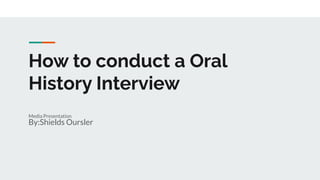
Media Presentation-Oral History-Oursler.pdf
- 1. How to conduct a Oral History Interview Media Presentation By:Shields Oursler
- 2. What is Oral History? ● Oral history is a way to collect and preserve information from people, families, and large events through the process of a recorded interview. ● Examples of how aN interview can be recorded include: ○ Written ○ Videotaped ○ Audio
- 3. Where to start? ● Find a topic to center your research around. ○ Choose a topic that interests you and you can do research on. ○ EX: Society and Change. ● Next decide who to interview! ○ Decide interviewee demographic (age, race, gender, Etc.) ○ Family, Friends, and Coworkers are a great place to start when finding an interviewee. ■ When interviewing/researching large groups make sure to consider the differences between the demographic and how it connects to the topic you chose.
- 4. Interviewee Permission ● Once you have found an interviewee it is crucial that you get written permission from your interviewee that allows you to record them as well as use their comments. ○ Creating one generic form for the interviewees as well as looking on the internet for pre made forms are two ways to make sure you have written permission as proof. ● It is also important to note that the interviewee can decide to be anonymous. ○ This means that you can collect and use the interviewees comments as information but cannot use their name or anything that could identify them.
- 5. Leading questions ● The first question is very important and must be planned ○ Why? - This question will set the tone for the interview ○ You want to have a question that will make the interviewee comfortable as well as want to open up and talk. ■ Examples such as “Where are you from?” and “What was your upbringing like?” are two great ways to make an interviewee feel comfortable and confident in their answers.
- 6. Next questions ● The next questions you ask should connect to your topic/theme of your oral history interview. ● Ask questions that could provide insight into your topic that you perhaps were not privy to beforehand. ● Open ended questions are also a key piece in uncovering more information. ○ “What was the biggest societal change you have witnessed in your lifetime?” ○ “What motivates you? ● It is important to plan your questions out in advance to make sure the interview does not stray away from the purpose of the interview. ● Remember to allow your interviewee to speak and try not to interrupt!
- 7. Specific Questions ● While conducting the interview it is okay to ask questions that you have not planned out but make sure it is related to something the interviewee said. ○ This can make the interviewee feel heard/acknowledged ● It is important to ask questions that will encourage the interviewee to get into descriptive details of their story so you can find patterns in the theme of the interview.
- 8. Wrapping it up! ● Always make sure you leave time for clarification and follow up questions. ○ You want to ensure that everything the interviewee is willing to share gets shared! ● When you believe you have gotten everything out of the interview gear towards slowing things up, and respectfully guide the interview to its conclusion. ● Once you have ended the interview compare and contrast you interview with others you have done. ○ Are there similarities in any of the interviews you composed? ○ Did you learn something new from an interview that connects to another interviewees experience? ○ How does all the information you have gathered add to your chosen topic?
- 9. Conclusion ● Now that you have gathered and filtered through all the information you have collected through your interviews and applied them to your topic you should have an exponential understanding of your topic and how to back it up with solid proof. ● You have now know how to conduct an oral interview go out their and learn something new!